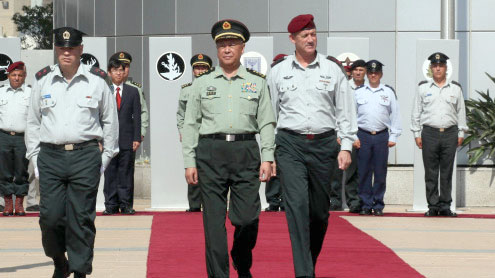 JERUSALEM: After years of rocky relations, Israel welcomed China’s military chief Sunday for the first such visit, giving Israel an opportunity to increase its profile with the economic giant as China seeks to strengthen its foothold in the Middle East.The two countries have infuriated each other in the past decade — Israel has canceled arms sales to China under U.S. pressure, and China has warmed up to Iran, Israel’s chief adversary — making the visit a high-stakes meeting with potential to make amends and find new pathways toward military cooperation and trade.
JERUSALEM: After years of rocky relations, Israel welcomed China’s military chief Sunday for the first such visit, giving Israel an opportunity to increase its profile with the economic giant as China seeks to strengthen its foothold in the Middle East.The two countries have infuriated each other in the past decade — Israel has canceled arms sales to China under U.S. pressure, and China has warmed up to Iran, Israel’s chief adversary — making the visit a high-stakes meeting with potential to make amends and find new pathways toward military cooperation and trade.
Chinese chief of staff General Chen Bingde was greeted with a full honor guard. In his brief visit, he is set to tour the Israeli military’s urban warfare training center, observe training exercises, and hold security briefings with the Israeli military chief of staff, Lt. Gen. Benny Gantz, and Israeli security officials.The visit is unlikely to yield any major sales of military hardware, say Israeli experts in Chinese affairs.It follows Israeli Defense Minister Ehud Barak’s trip to China two months ago — the first visit of an Israeli defense minister in a decade — and some say it could help improve relations between the two countries.
“The mere fact that he is coming is great breakthrough,” said Aron Shai, a rector at Tel Aviv University and a China expert.According to a Chinese Defense Ministry statement, Chen is visiting Israel to “deepen understanding, enhance friendships, expand consensus and promote cooperation” with the army. Chen is also visiting Russia and Ukraine.Diplomatic relations between China and Israel were established in 1992, and they traded military technology heavily for nearly a decade. The United States cut that cooperation short in 2000, when it pressured Israel to cancel its sale of sophisticated reconnaissance aircraft to China, which it regards as a potential long-term adversary. The canceled deal infuriated China, cost Israel hundreds of millions of dollars and frayed ties between the two.
Then, in 2005, the U.S. persuaded Israel not to service spare parts for unmanned aircraft drones already sold to China, concerned that it would upgrade China’s airborne anti-radar capability.Israel has since taken a wary approach to any kind of trade with China that could be deemed questionable by U.S. standards — limiting its exports of goods that could be seen as giving China a military advantage, including the state-of-the-art surveillance equipment and homeland security technologies that have made Israel a leader in that field.The American embassy in Israel had no comment on the visit.
China and Israel may try to “find loopholes” in U.S.-imposed limits on Sino-Israeli military relations, though there would not be any breakthroughs, said Yitzhak Shichor, a political scientist and China specialist at the University of Haifa.Despite the restrictions, China is Israel’s third largest trading partner, following the United States and Germany. In 2010, trade levels reached $6.7 billion, a growth of 44 percent from the previous year.Military technology will undoubtedly be discussed during the chief of staff’s visit, though no major sale is expected, said Yoram Evron, an Israeli professor of Asian studies at the University of Haifa and a research fellow at the Institute for National Security Studies.
China has held recent joint military exercises with Turkey, has sent ships to the Gulf of Aden to fight pirates there, and has pledged a large number to the peacekeeping force in Lebanon, making it one of the largest contributors to the multinational force dispatched in the aftermath of the 2006 war between Israel and Hezbollah guerrillas.The visit could also give Israel a forum to raise its own concerns with the Chinese military chief. Israel suspects some Chinese-made rockets have gotten into the hands of Palestinian militants in Gaza. Israel is also concerned about China’s ties with Iran and its vetoing of sanctions on Tehran at the United Nations. Israel considers Iran a strategic threat because of its nuclear and missile programs. – Khaleejnews












